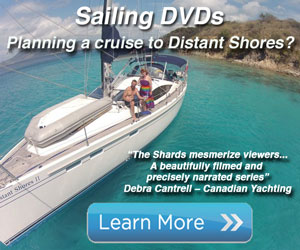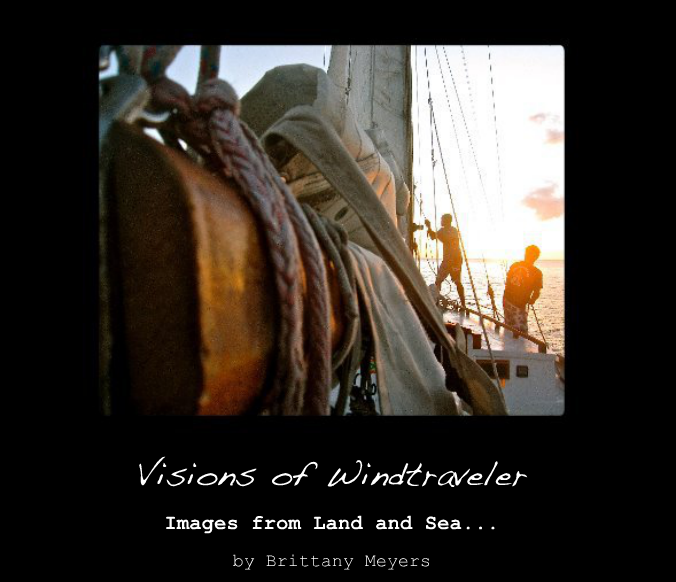We get a lot of great emails from fans and followers and while I do respond personally to just about every email we get, it has become a little more difficult as our blog gains more and more popularity so I am (in the process of) creating this page to help answer some of the more common questions. Before you read on, I would like to first invite you to read our disclaimer.
- Did you have experience before you set off? Yes. Scott and I actually met racing sailboats on Lake Michigan. I grew up sailing with my family and cruising Lake Michigan in the summers. Scott grew up sailing a small trailerable boat and dinghies. We both definitely knew how to sail and knew our way around boats, but daysailing and cruising are two very different things. The learning curve was still very steep. Don't let lack of experience stop you though, as plenty of cruisers are out living large and making it happen who started with no experience.
- What do you do for health insurance? When we left on our first boat, Scott and I were both uninsured. Healthcare abroad is very cheap and affordable for the typical maladies and being that neither of us had any pre-existing conditions and were very healthy, it was a risk we were willing to take. Eventually, I paid out of pocket for insurance through Blue Cross Blue Shield when we thought that the possibility of starting a family was real and now we are all self-insured through BCBS. I wrote a bit about insurance here and there is some useful info in the comments as well. This is a very personal decision and can come at a very significant cost (whether you decide to pay for it or risk going without) so I urge you to do your homework.
- Do you have boat insurance? Our first boat was uninsured (again, a risk we were willing to take) and because our second boat was a significantly larger investment, we decided to insure her. It's worth noting that some, but not all, marinas require liability insurance (at the very least) so if you plan on being dockside a lot, you need to consider that. Furthermore, insurance companies will often dictate your cruising plans with most demanding that your boat reside outside of the hurricane box between the months of June and November. This may or may not be an issue for you. While we have never needed to use our insurance, we know plenty of cruisers who have so there is definitely something to be said for covering your bases. We found our insurance carrier through the Gowrie Group, which is an insurance broker and checked out several different companies for us.
- How do you get internet aboard? There are a few ways. The main way we connected in the Bahamas was with a local SIM card (with a data plan) that we were able to insert into an Ericsson wireless router in order to turn our boat into a hotspot (read more here). This worked very well in the Bahamas (Exumas in particular which is where we cruised) where cell service is pretty common, but wifi is less so (many of the islands are uninhabited). This was also easy because the the Bahamas Island Chain (which consists of hundreds of islands) all operates on the same cell service so one SIM card can cover you for your whole time there. This option doesn't work so well in the Caribbean where every island is it's own country and therefore it's own cellular carrier. While you certainly can buy a SIM card with a data plan for each place, we preferred to rely on WIFI hotpots. To do this, we had a Rogue Wave WIFI booster on board which would pick up wifi signals from land and broadcast them to our boat via a router, essentially turning our boat into a wifi hotspot. While wifi is pretty easy to come by in the Caribbean now, it's quickly becoming a paid-for service with more and more signals being "locked" so keep this in mind. Another way we can communicate and get internet on board is through our SSB (we can Tweet, email, post picture-less blogposts and create Facbook updates with ours), which I wrote about here.
- I want to start a sailing blog, how do I do it? Blogging is fantastic. I love it. If you are on the fence, here's a great article on 15 Reasons You Should Blog and I can vouch for every single one. Starting a blog is easy peasy. The top platforms are Blogger (which we use and are super happy with; very easy, user friendly and free) and Wordpress (slightly more complicated but offers more customization, also free). I would do some homework as there are pros and cons to both, but you can go from zero to blogging in about ten minutes with either. For more tips on how to create a successful blog, check out my post Tips for the Cruising Blogger.
- How do you get your sponsors? Basically, we ask. This is the number one way we get our sponsors. We are also approached quite a bit by companies who want to work with us although 9 times out of 10 we turn down those opportunities. I wrote a post on How To Get Sponsors way back when, and the formula is still the same. We have literally saved thousands of dollars thanks to our sponsosrs!
- How much money does it cost to cruise? The cliche and short (yet accurate) answer? As much as you have. For more info on the subject, please see our Cruising Kitty page.
- How do you make a living? When we left in 2010 we left with savings enough to keep us afloat for about a year (figuring on about $1,500 a month) and we always figured we'd stop for work along the way. When we got to Grenada, we realized we need to make some dough in order to keep afloat and we got INCREDIBLY lucky. Scott got his 200 ton captain's license and an awesome job as the relief captain for Island Windjammers. His work schedule was one month on, three months off and it was a pretty sweet deal. It was not easy to be apart for a month at at time and his schedule certainly effected our cruising plans (we had to stay Caribbean based, we needed to stop for a month at a time..,etc), but we cruised with a full kitty and then some so we had no complaints. Now that we are land based for a while, Scott is working in real estate to make more money and we are hatching a plan to invest in rental properties to create a passive income stream as leaving me alone on a boat for a month at a time with three babies is not feasible. We'll keep you posted.
- Do you recommend a project boat or a ready to cruise boat? This requires a blog post but we would caution anyone who is inexperienced to buy a bonafide "project boat." First of all, EVERY boat is a "project boat" and no matter what sort of boat you buy, you will inevitably make changes and put more money into it that you ever imagined (this is a promise). If you knowingly buy a "project boat" you will not only end up spending at least three times what you think you will (there will always be unforeseen projects that pop up...always) but you also might end up working on your boat at the dock for years before you get underway and, in the end, spend as much money on your project boat as you would have on a boat that was more "ready to go". If, on the other hand, you know your way around boats, are very handy and legitimately know what you are getting into when you purchase a "project boat" - it can be a very rewarding experience which will result in you having a boat that is exactly to your liking that you know like the back of your hand. There are advantages for sure but it is our experience that for the average Joe, investing in the best boat your money and budget can allow will be better in the long run. This is the short answer, I'll write more in depth on the subject at a later date.
- How do you go about provisioning? There are two kinds of cruisers in this world: those that love provisioning, and those that despise it. I am of the latter. Alas, it must be done. I wrote a post on provisioning a while back which includes our most recent provisioning list that you are free to download and might find helpful. But an even better place to learn about all things galley and provisioning is over at my friend Carolyn's blog, The Boat Galley. She is a galley rock star and will set you straight with all her awesome tips, tricks and insights. I will probably just confuse you.
- What gear do you find essential on a cruising boat? This is a very subjective and personal list. There are lots of Types of Cruisers and we are what you might consider "comfort cruisers" meaning we enjoy being very comfortable on our boat. That means having lots of fresh water for bathing, a nice and roomy interior, a comfortable cockpit free from the elements and other nice amenities such as roller furling sails, a windlass, aft deck shower and all that good stuff. We are by no means a "simple" boat. I wrote about the Top Ten Systems on our old boat and many of those still ring true - but we've grown since then (for example, we now have a high output water maker and wouldn't trade it for the world as well as a pretty sweet rigid inflatable dingy with a 15 HP motor which we also wouldn't trade in) and I'll write another post on this subject at a later date.
COMMON QUESTIONS POSTS
Common Questions we Get (written before we shoved off in 2010)
MORE Answers to Common Questions
10 Questions for Windtraveler - our interview with Newly Salted
You Asked, We're Telling: More Answers to Common Questions
The Two Most Common Questions We Get
The Liebster Award: Thirty Questions from Fellow Bloggers
TOP TEN/LIST POSTS
For more tips and insights into the cruising lifestyle and world, please check out our "Top 10" series of posts - you might find more answers right there! Of course it should go without saying that these lists are completely subjective and reflect our opinion and our opinion only - you might have different ideas and experiences, and we welcome you to share your thoughts in the comments. It should also be noted that these are also in no particular order and some might be very outdated and refer to our first boat, Rasmus (Halberg Rassy Rasmus 35), while others refer to our second boat, Asante (Brewer 44).
10 Things to do When Leaving Your Boat for a Short Leave
10 Simple (and inexpensive!) Products We Love on our Boat
10 Great Toddler Toys for the Space Conscious Parent
14 "Side Effects" of Living on a Boat
11 Ways Cruising Friendships are Different than Others
10 Simple (and inexpensive!) Products We Love on our Boat
10 Great Toddler Toys for the Space Conscious Parent
14 "Side Effects" of Living on a Boat
11 Ways Cruising Friendships are Different than Others








2 comments:
I am entering my retirement with the dream of getting a project boat,(I'm a millwright) and sailing it....south, I'm in Toronto. I have been doing so much research on what I may need that I had booked mark so may page's I was getting dizzy. Then I read your blog...Thank you for being so complete in your info. Now I 2 booked mark page's...Yours and the boat I'm looking at.
Borderfreehealth.com is an innovative platform revolutionizing access to healthcare by transcending geographical boundaries. With its user-friendly interface and comprehensive services, it connects patients with top-notch medical professionals worldwide, ensuring timely and quality care regardless of location. This groundbreaking initiative exemplifies the transformative potential of technology in bridging healthcare disparities and promoting global wellness. Kudos to BorderFreeHealth - Online medical store for pioneering accessible healthcare solutions
Post a Comment